How Does a Boiler Work? (Types & Uses Explained)
-

- Last updated:
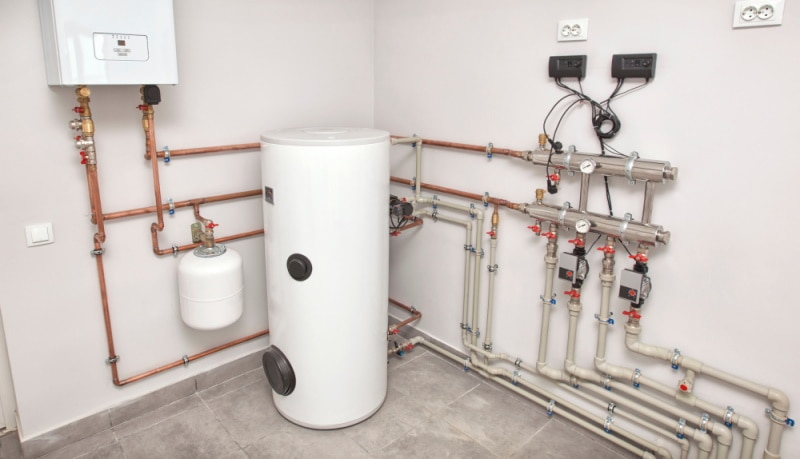
In the United States, most homes are equipped with either furnaces or boilers. Furnaces are cheaper and can both cool and heat. However, boilers are more efficient, reliable, and (can be) environmentally friendly. Besides, with boilers, you can choose between various configurations. How does such an apparatus work, though? What’s the best use for it in a modern-day house, and why?
A boiler is a steel vessel that’s specifically designed for heating water. For that, it uses gas, oil, coal, or electricity. But how long do these mechanisms last? More importantly, will a boiler be the best investment for your home? If you’re having a hard time picking between a boiler and other heating systems, this guide will help you decide. First, we’ll talk about boilers and how they work. Next, we’ll cover different heating types, AFUE standards, and common uses, and compare boilers to water heaters. Let’s begin!
 How Does It Work?
How Does It Work?
Depending on the boiler type, heated water is either converted into steam or sent directly into the pipes and radiators while it’s still in liquid form. At the heart of all boilers lies circulation. On its way back from the radiators, the water or steam cools off a bit only to be heated once again by the coils and sent back up.
By giving off its heat, the water or steam warms the air, which increases the temperature in the room. Most boilers come packed with a thermostat or another device for controlling the temperature. So, if it’s getting freezing outside, you can crank it up to keep the house warm. Boilers are efficient, simple, and easy to fix. That’s why they’re used not only in residential areas but also in many commercial industries.
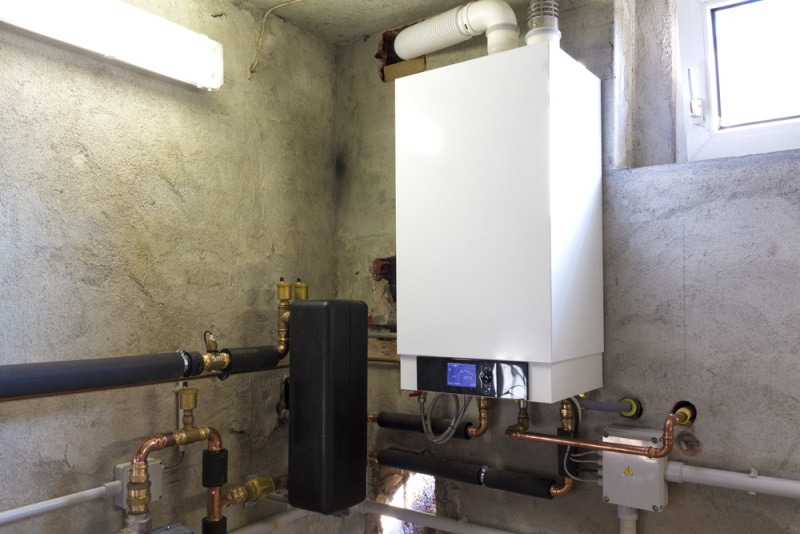
Fuel Utilization Efficiency: What Does It Mean?
Every single furnace or boiler has an efficiency rating. To comply with the regulations of the Federal Trade Commission, manufacturers have to indicate the AFUE (annual fuel utilization efficiency) of their heating systems. Otherwise, they won’t be allowed on the market. This is done so potential customers can compare different devices based on efficiency. But wait—how do you make sense of it all?
Here’s the deal: if you see a tag “80% AFUE”, that means 80% of the fuel burned by the furnace was put to good use (heating the home). As for the other 20%, it vanished into thin air. A decent AFUE rating is 90%/10%. If you want 95–100% efficiency, invest in an electric boiler. Also, keep in mind that units installed indoors will always be more efficient than the ones mounted outdoors.
What Are the Different Types of Boilers?
Before you contact a qualified expert and have them install the boiler, it’s important to know about the options on the table. There are quite a few different setups, and they all have their pros. For example, electric boilers are gaining in popularity because of their eco-friendly nature, while oil boilers are outdated and not that great for the environment. Here’s a closer look at what the market has to offer:
Hot Water Boilers
First, the water is heated by the boiler. Next, once it reaches the desired temperature set by the thermostat, the hot water flows into the radiators. The boiler uses an old-fashioned yet highly efficient pumping system to circulate the water through the entire house, keeping every single room warm. On its “journey”, the water cools a bit, but the boiler boosts the temps back up. Hot-water boilers rely on burned oil or gas for heating.
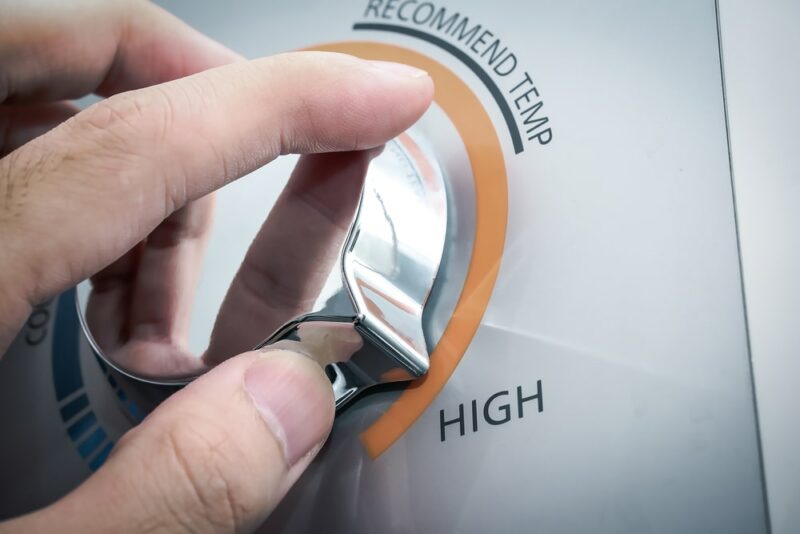
Steam Boilers
Steam boilers also use water for heating. However, it’s boiled at much higher temps and turned into steam. Here’s how it works: the boiler is filled with water. When it transforms into steam, the pressure in the pipes goes up and drives the steam into the radiators, opening the air vents. While trapped inside the radiators, the water “shares” the heat, turns back into water, and returns to the boiler to repeat the process. For this boiler to work, you need to maintain proper water levels.
Natural Gas/Oil Boilers
If you live in a more developed part of the country, you’ll have access to a pipeline. Folks in rural areas, however, rely on gas tanks or wood for heating. The boiler is equipped with a temperature gauge and control system for setting the temperature. It also has coils for heating the water. The same goes for oil-powered boilers: they heat the water and send it through the radiators/pipes. These systems aren’t very efficient, though.
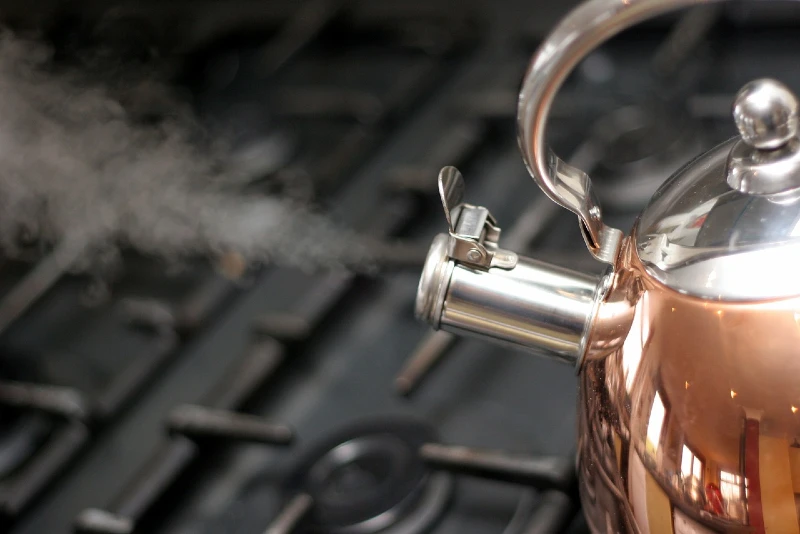
Condensing Boilers
Looking for an energy-efficient heating system? Then condensing boilers deserve their attention. Instead of letting the heated exhaust fumes go to waste, they use it to “warm up” the cool water that flows back from the radiators. As a result, your heating bills are much lower than they would’ve been with a standard boiler. These heaters are often fueled by oil, gas, or coal (rarely used these days).
Electric Boilers
Fossil fuels aren’t the only energy source that you can use in a boiler. Electricity works as well. Just like a condensing boiler, an electric unit is incredibly fuel-efficient (no vapors robbing the system of precious heat). More importantly, it doesn’t produce any toxic fumes, which makes it an environmentally-friendly heating system. More good news: electric boilers are smaller, quieter, and cost less to install.
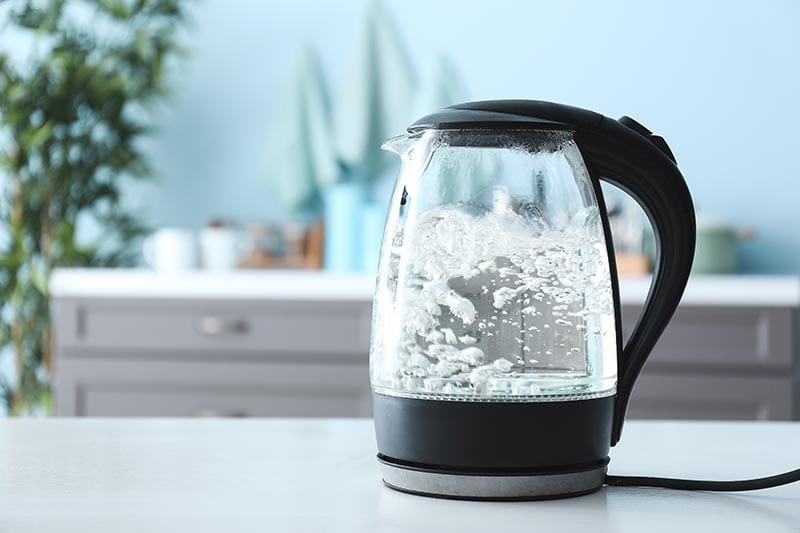
 Where Are Boilers Used?
Where Are Boilers Used?
Thanks to their universal design, reliable construction, and high efficiency, boilers are often used in commercial, industrial, and utility sectors. We’re talking about shopping malls, hospitals, schools, and other buildings that need heating. On top of that, boilers are used in breweries and distilleries as cheap, long-lasting heating systems. The same goes for laundry facilities (commercial businesses).
Then we have the automobile industry, textile facilities, and paper factories. The food industry also finds great use in boilers of all shapes and sizes: many foods go through a heating/boiling process before hitting the market. Some examples include sugar mills and meat/poultry processing facilities. And let’s not forget about power plants that generate and deliver heat (water, steam, or hot air) to residential areas.
If you live in a house that’s connected to central heating, most likely, it’s equipped with a powerful boiler. And, while furnaces are slowly taking over the market (at least a part of it), boilers are still valued for their lower post-installation cost, flexibility, and strong performance. To recap, here’s a quick look at industries/sectors that use boilers:
Industries & Sectors That Use Boilers
- Schools, campuses, and universities (to keep the students warm)
- Shopping malls and grocery stores (for heating large spaces)
- Breweries, distilleries, and meat processing facilities (necessary for brewing/other tasks)
- The automobile industry (coating, surface treatment, rinsing, and cooling, to name a few)
- Paper and textile-producing facilities (steam and electricity for heating)
- Laundry facilities (the washing efficiency will be very low with cold water)
- Power plants (to generate cheap, reliable energy for homes)
- Private homes (as an eco-friendly, high-efficiency heating system)
- Available in different configurations. With boilers, you’re not limited to gas or oil: electricity is also an option. And then we have condensing systems with above-average efficiency ratings. Each option has its pros and cons, and they appeal to slightly different customers. Some houses are connected to a central natural gas pipe; others have access to cheap electricity. So, you’ll always be able to find a unit that suits you best.
- Reliable, rarely break down. Boilers are easy to use, do a great job of heating large areas, and can be equipped with a thermostat. They deliver the heat evenly, too, which means no room will be too hot or cold at the expense of other spaces. Plus, thanks to the (relatively) simple and sturdy design, these units require little maintenance.
- Efficient: make every fuel drop count. If you opt for a condensed or electricity-powered boiler, you’ll get a highly efficient heating device. Thus, while the initial installation cost is a bit steep, in the long run, a boiler will be money well spent. Oil, gas, and propane boilers are slightly less cost-effective, but still on par with most furnaces.
- Clean, environmentally friendly. Systems that run on fossil fuels aren’t exactly good for the environment. Thankfully, electrical boilers are equally efficient and eco-friendly. Natural gas is also a decent choice.
- Noise-free and good for your health. If you invest in a decent-quality boiler, you’ll be impressed by how quiet it is. The fact that it won’t make the air dry or contaminate it by moving dust and dirt around the house is a nice bonus.
- Installation prices are a bit steep. From a financial standpoint, boilers are a serious commitment. The initial payment (for the actual boiler, the pipes/radiators, and the installation) is very high. But, if you’ve saved up enough and are planning on living in the same house for at least a decade, it will be worth it.
- Take time to set/adjust the thermostat. If you’ve ever tried adjusting a boiler to your liking, you know that it’s a time-consuming procedure. The process is very straightforward, though. The real downside is that it takes a boiler quite a while to respond to quick changes and increase or reduce the temperature.
- Only capable of heating, not cooling. In contrast to a furnace or other heating systems, a boiler can’t cool the air. That means you won’t be able to rely on it to keep the temps down during the heat. But that’s compensated by a better AFUE, a decent lifespan, and lower repair costs.
 Frequently Asked Questions (FAQs)
Frequently Asked Questions (FAQs)
Boiler Versus Water Heater: What’s the Difference?
At a glance, these systems might look identical, but they aren’t the same thing. A water heater does exactly what the name implies—it heats water. It has only one job: to warm up clean, cold water and to send it to the kitchen and the bathroom. The water that comes from a water heater is used for washing hands, taking a shower, and cooking. You can also drink this water. Boilers, in turn, focus on heating the home.
The water that’s heated by a boiler and sent into the radiators or pipes doesn’t have to be drinkable: it’s boiled to keep the house warm. That’s the key difference between these two mechanisms. Water heaters only work with water. Boilers also use steam (which, essentially, is heated water). It weighs less and can keep the temps up for longer
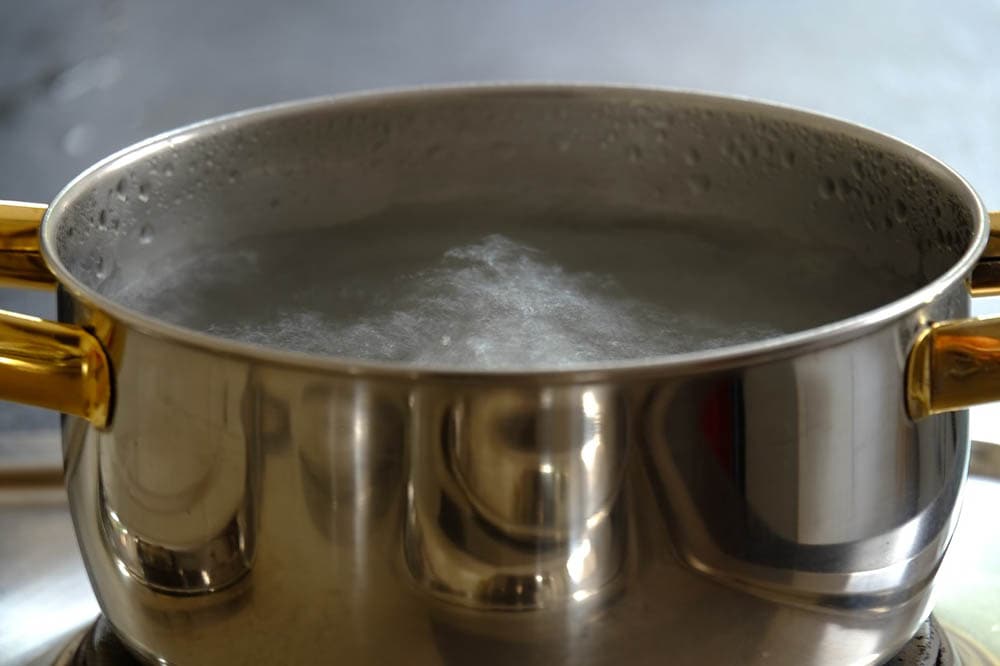
Are Boiler Leaks Dangerous for Your Health?
Yes, gas leaks can be incredibly dangerous. We can’t see, smell, hear, or feel toxic chemicals like carbon monoxide. That’s why you should consider investing in a CO detection system. Without it, you might not even know that you’re being exposed to lethal doses of this hazardous chemical. If you suspect something, be quick to open all windows and doors and report a gas emergency.
As for leaking water, while it might not be a life-threatening situation, the consequences could still be rather severe. First, if it comes in contact with electricity, that can cause a short circuit. Next, the pipes will rust and corrode, which won’t be cheap to fix. And let’s not forget about potential damage to the structure of the house. Heated water is capable of ruining wood floors and cabinets, warping the walls, and cultivating the growth of bacteria and fungi.
How Long Do Boilers Last?
Just like most heating systems designed for households, boilers are built to last. They are resistant to temperature extremes, high and low humidity levels, and other climatic conditions. As for the lifespan, it depends on the brand, boiler type, the installation process, and, of course, maintenance. Now, if you just had a professional set everything up for you, expect the boiler to last for 10–15 years.
To increase its service life, learn how to take care of it. Mostly, we’re talking about annual checkups and servicing (like removing the limescale). On top of that, remember to keep it ventilated, maintain proper water pressure, and bleed the radiators occasionally. This way, the boiler will last for an extra 5–10 years, but after that, a replacement will be in order. The reason: it will cost less to just install a new boiler instead of trying to revive the old one.
| When to invest in a Boiler | When not to invest in a Boiler |
| You’re looking for a clean, silent heater | You need a heating + cooling system |
| Cost efficiency is of utmost importance | High installation costs are a turn-off |
| Heating consistency is a top priority | There’s already a furnace installed |
| You value durability and reliability | You change thermostat settings often |
 Conclusion
Conclusion
Boilers are a bit outdated compared to forced air systems, but they do have a wide range of pros that outweigh the cons. If you’re in the market for a durable, easy-to-fix, and highly efficient heating apparatus, a boiler will be worth every single penny. It ensures consistent heating, costs less to run after the installation, and delivers noise-free performance.
Also, most boilers are eco-friendly and don’t produce toxic fumes. On the downside, they can’t keep the house cool during the summer heat. Furthermore, professional installation is expensive and will cost more if you want to replace a furnace with it. Still, in the long run, boilers offer a bang for the buck by providing steady, reliable heating.
- Com – How Long Does a Boiler Last?
- DHS-UK.Com – Are Boiler Leaks Dangerous?
- Com – Report A Gas Emergency
- Com – Different Types Of Boilers
- Com – What Industries Utilize Boilers
- Com – How Much Does Boiler Installation Cost?
- Gov – Natural Gas And The Environment
- Com – Engineering: Boiler
- Org – Residential Uses of Natural Gas
- Com – Electric Boilers
- Gov – FAQ: What Is Carbon Monoxide?
- Gov – Furnaces And Boilers
Featured Image Credit: Skylines, Shutterstock
Contents
 How Does It Work?
How Does It Work? Where Are Boilers Used?
Where Are Boilers Used?